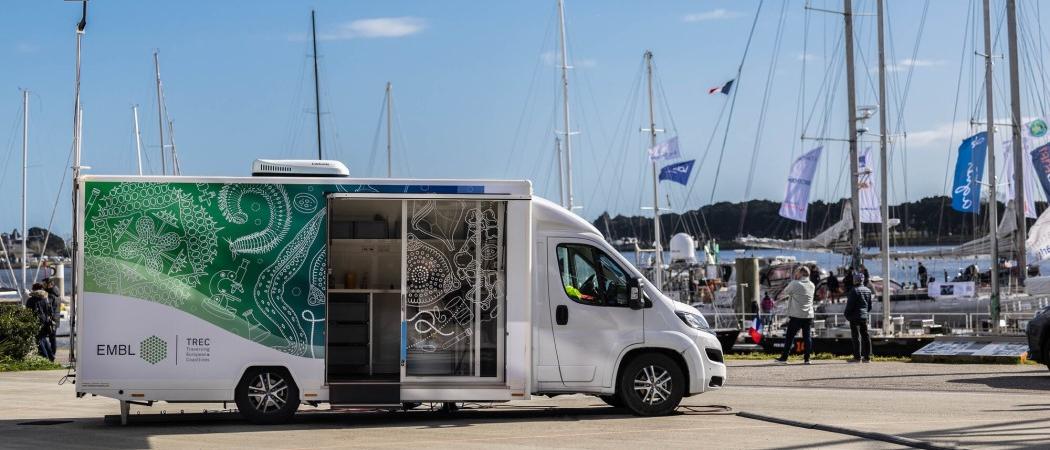A new project is taking the laboratory to the samples, enabling on-site analysis of coastal organisms at 100 locations around Europe

EMBL’s sample processing lab at Lorient alongside the Tara research schooner. Photo credit: Kinga Lubowiecka/EMBL
A first-of-a-kind research expedition is pioneering the use of mobile laboratories to understand how Europe’s coastal ecosystems are impacted by environmental factors such as pollution, loss of biodiversity, and climate change.
The mobile truck laboratories will bring state of the art equipment and technologies to over 100 locations along the coast in 24 countries, where scientists will collect samples and analyse them directly on site. This will be the first time researchers have been able to carry out such detailed molecular biology research in the field.
Studying the ocean has always been more difficult than studying the land. Some of the challenges include a lack of visibility, pressure changes, salinity that can wreak havoc with equipment, and tides. Compounding this is a lack of standardisation of hardware, surveying methodologies and systems for recording data.
Carrying out molecular biology research in coastal ecosystems is even more challenging. Organisms die in transit to central laboratories, and that’s why the Traversing European Coastlines (Trec) project has developed mobile laboratories to take the complex technology needed to analyse samples into the field.
“We realised that today we have the technologies and the power to explore these land/water interface ecosystems in a completely new way,” said Edith Heard, director general of the European Molecular Biology Laboratory (EMBL), which is coordinating Trec with France’s Tara Ocean Foundation and the European Marine Biological Resource Centre.
“We are bringing technologies to where life is happening, and where the scientists want to use them, as opposed to always having to rely on shipping things back to some place that has the right material, the right machines,” Heard said.
The project, which stated last month, involves 120 different sampling stops along the EU coastline, starting at Roscoff in France. At each site, the team will lay transects from the Tara foundation’s schooner at anchor, to the shore. A variety of soil, sediment, and water samples will be taken.
These will be analysed in mobile labs equipped with microscopes, freezers, and equipment to prepare samples for imaging, genomic and metabolomic analysis, which will travel between sites.
Protein complexes
The approach is already delivering results. “We can see the ultrastructure of dinoflagellates as never seen before, with many new organelles not known before, for which it will take us years to unravel their functions,” said Detlev Arendt, senior scientist at EMBL. “We also expect that new protein complexes will be described in the next couple of years thanks to the field data that is being generated.”
While in fields such as healthcare, mobile labs are becoming commonplace, they are not yet mainstream in environmental science. One aim of Trec is that this way of working will become the standard amongst molecular biologists working in the field.
“Based on first experiences, mobile laboratories can make a very important contribution to data collection methodologies, especially in implementing quality assurance and quality control protocols,” says Giuseppe Manzella, co-founder of OceanHis, a company that manufactures mobile mini-labs that collect ocean data in real-time.
The mini-labs can be installed on different kinds of boats, and use a range of sensors to collect physical, geochemical and biological data, such as temperature, salinity, chlorophyll levels, blue algae, oxygen levels, conductivity and turbidity.
“The method is completely different from the classic method of collecting samples and analysing them in the laboratory,” Manzella said.
The research being carried out by the Trec project will add to knowledge about the sections of the European coastline that will be surveyed, said Kate Larkin, head of the European Marine Observation and Data Network. By combining the Trec data with the wide range of data available in existing European Marine Observation and Data Network (Emodnet) datasets, new insights will be unlocked.
“This type of data is valuable, but if you imagine lots of different point data being put together, you suddenly start getting a real picture,” Larkin said.
Although originally focused on physical and chemical data, work is ongoing to incorporate more biological and genetic information into Emodnet’s vast databases.
Joining up the dots between the different forms of data is essential to give researchers a clear picture of what’s going on, notes Larkin. “People don’t just want to know the spatial distribution of killer whales. They also want to know what’s in the water column and what’s on the seafloor,” she said.
EMBL hopes the mobile labs will set a new standard for environmental molecular biology and that the results of the TREC expedition will become a reference point for other researchers.
“We’re not just doing experiments in our research. We’re providing infrastructure. And we provide all our data resources openly,” said Heard. “As a research infrastructure, we have to rise up to the next challenges. We need to do [this] now because climate change is hitting fast.”
The Trec project is not part of the Horizon Europe Oceans Mission, but it is complementary, Heard said. There will be cross-benefits between Trec and a project that is part of the Oceans Mission that EMBL is also involved in, called BIOcean5D, which will investigate marine biodiversity on a large scale. BIOCean5D is working on the standardisation of protocols for environmental data collection, which will feed into Trec.





 A unique international forum for public research organisations and companies to connect their external engagement with strategic interests around their R&D system.
A unique international forum for public research organisations and companies to connect their external engagement with strategic interests around their R&D system.